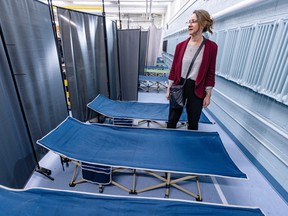
St-Michael’s Mission has long operated as a day centre, but with no continuing funding, “our hand was forced” to open emergency beds.

Article content
For more than 90 years, St-Michael’s Mission has been a downtown Montreal drop-in centre, a day shelter where people can have a hot meal and a shower, help from intervention workers and the sense that they belong somewhere.
“We are giving people frontline services — but also a community,” said executive director Julie Faulkner, who refers to clients as “guests.”
Advertisement 2
Article content
Article content
“A lot of our clientèle are what we call chronically homeless. They need a lot of help and have an important level of trust in us.”
Michael Morrison, a 66-year-old former foundry worker, has been coming to the mission almost daily since arriving in Montreal from New England three years ago. “I can’t say a bad thing about anyone here. Everyone is so helpful,” he said.
Until now, the mission has relied on loyal donors including foundations, corporations and individuals for help funding its day shelter. But factors including increased cost of living and a spike in homelessness mean the generosity of its donors no longer covers costs. The annual budget for the day shelter’s general operations is $525,000.
And yet it is precisely the rise in homelessness that has increased the need for day shelters, mission staff say.

“What St-Michael’s does so well is individual interventions,” said mission project manager Tara Tallentire. “We are a drop-in centre. We are that link. We help people during the day. We rely on foundations and individuals who give generously, but it is not enough. Everybody is stretched. We cannot do what we do without increased funds.”
Advertisement 3
Article content
In December, the mission, located in the basement of St-George’s Anglican Church, on Stanley St. below René Lévesque Blvd., received provincial funding to serve as an emergency overnight shelter and operate 24/7 through March 2024. The provincial health authority for the region, the CIUSSS du Centre-Sud-de-l’Île-de-Montréal, is underwriting the program’s $650,000 cost.
“Our hand was forced because there was no continuing funding for day centres,” said Faulkner. “All the funding that is available from the province is to increase the number of emergency beds.”
Pivoting to a 24/7 operation has meant, among other things, tripling staff, acquiring cots and more than doubling the number of meals served: 15,000 meals were served in January, up from 6,000 before they were 24/7. A supervising intervention worker, along with one or two other intervention workers and three security guards, are on duty every shift.
The overnight shelter is often at double or triple its capacity, with 30 to 40 people turned away each night. Sixteen cots and 30 chairs were approved initially, but because need so outstrips capacity, 12 cots are used and 40 additional chairs are set up around tables. Turnover means people come and go all night, some nights up to 130. The mission’s three bathrooms — two for men and one gender-neutral bathroom — have showers, but the space was not intended to operate 24/7.
Advertisement 4
Article content
“Our resources are absolutely strapped — our physical as well as human resources,” Faulkner said. “We are scrambling.”
Many organizations helping unhoused people have requirements: that clients be sober or provide their names or agree to try to get off the street, for instance. The mission does not.
“Most of our clientèle suffers from extreme and untreated mental health and addiction issues,” said Faulkner. “They don’t quality for other organizations or they might have been barred from them.
“Our intervention workers try to link our guests with permanent housing, but a lot are not eligible for permanent housing. That’s why they need our support.
“Most of our clients do not use other facilities.”
Said Tallentire: “We are a place of last resort.”
Richard Roy has been unhoused for about a year, since losing his job. He has worked in fields including security and truck driving and wants to work, but says his piercings and tattoos make people reluctant to hire him.
“The mission is trying to help,” said Roy, 65. “I come here every day. We are warm inside, and it is like a family.”
Advertisement 5
Article content

A daycare operates in the same building as the mission. Faulkner said concerns were addressed with daycare management, the church and the city of Montreal. As part of a city initiative, she said, the mission has also reached out to neighbours, local businesses and partners to build relationships.
Around 8 a.m. on Feb. 2, the body of a 32-year old man police described as unhoused was found outside the mission by daycare staff. Police said it was possible he was a mission client; mission staff wouldn’t comment. The case has been transferred to the coroner to determine how he died.
The mission has been at its current location since January 2023. When its lease was not renewed for the space it had occupied for decades, in church on President Kennedy Ave., the city wanted it to remain downtown. Its territory is bounded by Sherbrooke St., St-Antoine St., Drummond St. and St-Laurent Blvd.
Finding a new place was “incredibly difficult,” said Faulkner, and the St-George’s space required extensive renovation: It had no bathrooms, for one. Still, the mission reopened in February 2023, soon after its move.
Advertisement 6
Article content
That there was no government help for the $250,000 cost of moving and renovating “contributed to our needing funding,” said board member Campbell Stuart.
“The overnight program helps with administration generally, but we need a substantial amount of money for operating expenses. Aside from private donors, the recognition is not there in our funding sources,” he said.
To Faulkner, it should be. “I think the government needs to take responsibility for its community members.”
Anyone, Stuart said, can experience a mental health crisis. “People can lose everything, often due to circumstances beyond our control.”
“Everyone should be worried about this.”
With homelessness growing, “we need organizations like St-Michael’s Mission that are open-minded and work well with other organizations in the sector,” said James Hughes, president and CEO of the Old Brewery Mission, Montreal’s largest homelessness organization.
Providing 24/7 services is a way to get to know people better and help them apply for services they need. Homelessness is a 24/7 concern, not just a seasonal one, Hughes said. “It doesn’t end at the end of March.”
Recommended from Editorial
Advertisement 7
Article content
Article content



